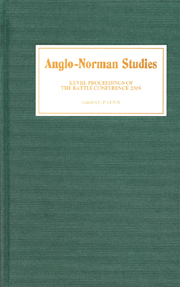Book contents
- Frontmatter
- Contents
- LIST OF ILLUSTRATIONS, MAPS, AND TABLES
- EDITOR'S PREFACE
- ABBREVIATIONS
- Inside the Anglo-Norman Family: Love, Marriage, and the Family (R. Allen Brown Memorial Lecture)
- Land Tenure and Royal Patronage in the Early English Kingdom: A Model and a Case Study
- The Homilies of a Pragmatic Archbishop's Handbook in Context: Cotton Tiberius A. iii
- Robert de Vaux and Roger de Stuteville, Sheriffs of Cumberland and Northumberland, 1170–1185
- The Common Steeple? Church, Liturgy, and Settlement in Early Medieval Lincolnshire
- The Question of Masculinity in William of Malmesbury's Presentation of Wulfstan of Worcester
- Share and Share Alike? Bishops and their Cathedral Chapters: The Domesday Evidence
- Dunstan and Monastic Reform: Tenth-Century Fact or Twelfth-Century Fiction?
- Domesday Now
Domesday Now
Published online by Cambridge University Press: 12 September 2012
- Frontmatter
- Contents
- LIST OF ILLUSTRATIONS, MAPS, AND TABLES
- EDITOR'S PREFACE
- ABBREVIATIONS
- Inside the Anglo-Norman Family: Love, Marriage, and the Family (R. Allen Brown Memorial Lecture)
- Land Tenure and Royal Patronage in the Early English Kingdom: A Model and a Case Study
- The Homilies of a Pragmatic Archbishop's Handbook in Context: Cotton Tiberius A. iii
- Robert de Vaux and Roger de Stuteville, Sheriffs of Cumberland and Northumberland, 1170–1185
- The Common Steeple? Church, Liturgy, and Settlement in Early Medieval Lincolnshire
- The Question of Masculinity in William of Malmesbury's Presentation of Wulfstan of Worcester
- Share and Share Alike? Bishops and their Cathedral Chapters: The Domesday Evidence
- Dunstan and Monastic Reform: Tenth-Century Fact or Twelfth-Century Fiction?
- Domesday Now
Summary
The world of Domesday studies is divided between those who use Domesday data and those who merely worry about them. Some five years ago Chris Lewis asserted that a sure-fire way of finding out what you are in for is to look up the word ‘pig’ in the index. If you find it you know that you are in for a feast of figures and yields. If not, look out for texts and procedure. I do not know which he intended as a recommendation. I am going to hedge my bets here. I want to look at pigs but in a non-piggy way.
In the last fifty years or so there has developed a growing awareness that the Domesday inquest was concerned with lordship. Outside the estate agent's office and the lunatic fringe, Domesday Book is no longer seen as a comprehensive Rough Guide to Norman England. Paradoxically, in tandem with this acceptance of the limitations of the source, there has developed a new confidence in its thoroughness and scope within its own remit. In the last twenty years sophisticated statistical tools have been brought to bear on the Domesday data, notably by Professors McDonald and Snooks, and the results have been held to be significant (both in the statistical as well as in the everyday sense). High correlations are found between almost all the variables of Domesday Book. Thus, it has been shown that manorial resources increase in proportion to the assessment of estates and that values accurately reflect this reality.
- Type
- Chapter
- Information
- Anglo-Norman Studies 28Proceedings of the Battle Conference 2005, pp. 168 - 187Publisher: Boydell & BrewerPrint publication year: 2006



